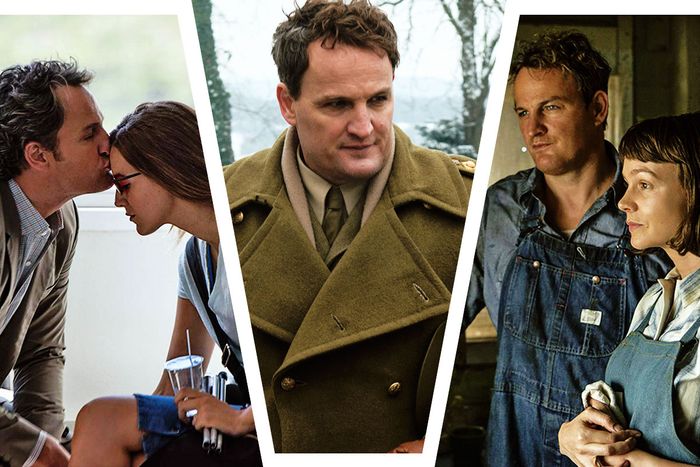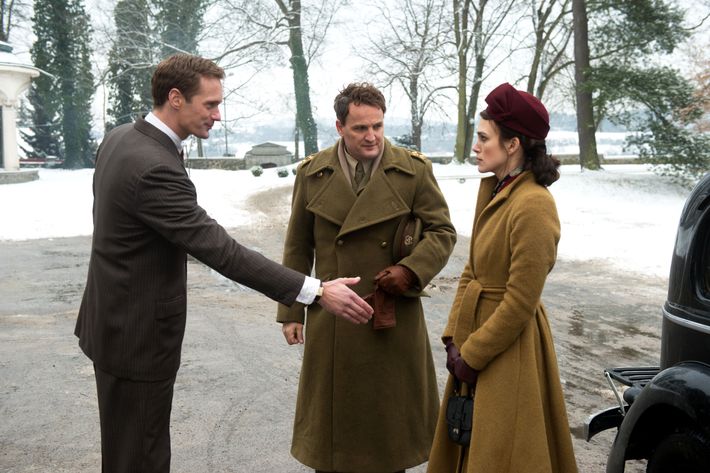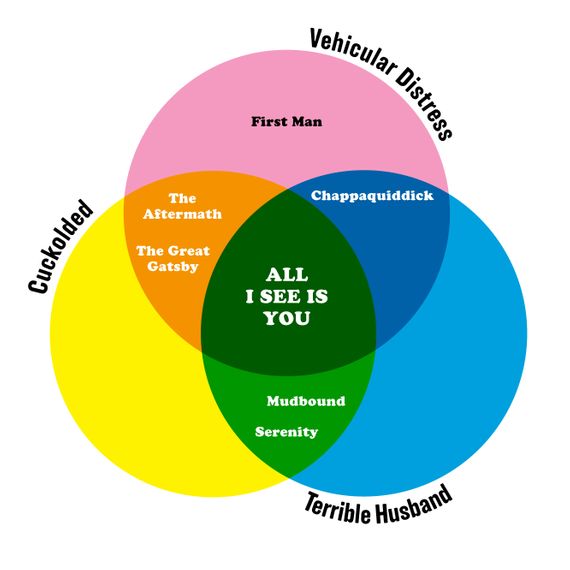
Every decade gets the Ralph Bellamy it deserves. In the ’90s, snarky Greg Kinnear habitually lost the girl to Hanksian nice guys. In the aughts, clean-cut James Marsden found himself overshadowed by sensitive brooders like Ryan Gosling and Wolverine. Recently, a new face of romantic failure has emerged: Australian actor Jason Clarke, who’s managed to carve out a healthy sideline playing some of the most disappointing husbands in contemporary cinema. Clarke’s presence is almost a walking spoiler alert at this point: If our heroine is married to him in the first act, by the end of the third you can almost guarantee that she’ll wind up having sex with another man.
In a strange turn of events, this phase of Clarke’s career has also coincided in a worldwide interest in cuckoldry. “Cuck” has become one of the defining political insults of our era, and if Pornhub is to be believed, it’s an increasingly popular sexual fetish for many men. It’s a timely kink for our current anxieties around masculinity: The cuck has assembled some of the outward trappings of success — by definition he’s got a wife, and there’s usually a house, some kids, and a car — but there’s a sense that he hasn’t properly earned these advantages, that there’s a better, stronger male who might deserve them more. Voluntary cuck play allows these men to play out a fantasy of debasement, without giving up the status they enjoy in their day-to-day lives. (No surprise that there’s often a racial element to the kink.) How do these anxieties play out in Clarke’s filmography? With the release of The Aftermath, a new film about Keira Knightley cheating on Clarke with Alexander Skarsgård, I decided to throw myself a small Jason Clarke cuckold film festival to find out.
First impressions are everything in Hollywood, and Clarke’s early American roles pegged the type he’d go on to refine over the course of his career. His physique was rugged and masculine, but his features, those large cheekbones that dwarf his narrow eyes, suggested a certain weariness, even defeat. He was rarely the hero — instead he played doomed henchmen, corrupt politicians, Feds who weren’t above getting their hands dirty. I haven’t yet determined the first time the actor was cuckolded onscreen, but it was happening as early as 2006, in the first season of Showtime’s Brotherhood, where his wife slept with the mailman.
In 2013 Clarke landed the part of one of literature’s most famous cucks, the hapless George Wilson in Baz Luhrmann’s adaptation of The Great Gatsby. As the physical embodiment of working-class despair, Clarke’s soot-ridden auto mechanic can’t provide the glitzy life that his wife Myrtle (Isla Fisher) dreams of, so she takes up with the wealthy Tom Buchanan (Joel Edgerton), who delights in flaunting the affair in front of the oblivious Wilson. In many ways this was the Ur–Jason Clarke role — Wilson doesn’t know a lot, but he knows on some level that he isn’t enough for his wife, and it’s that bone-deep sense of inferiority that spurs his shocking act of violence at the end. (With that violence set in motion by a fatal car accident, Gatsby also introduced the trend of vehicular distress, which is oddly prominent in Clarke’s filmography.)
After Gatsby, Clarke tried his hand at a few franchises, popping up in a Planet of the Apes and a Terminator, and he wouldn’t again be cuckolded onscreen until the little-seen romantic thriller All I See Is You. He plays James, the doting husband of Gina, who is both blind and played by Blake Lively, which should give you a good idea of what happens next: Gina gets surgery to restore her sight, which fills her with a renewed sense of joie de vivre and sexual exploration. James, too, sees his wife’s horizons expanding beyond what he’s able to provide — “You’re not how I imagined,” she tells him — and his response is first to turn inward in guilt and shame, then strike back with lies and manipulation. He’s simultaneously repulsed by and obsessed with the idea of Gina sleeping with someone more handsome and virile, which of course means that once their relationship breaks down, she has a torrid nooner with a friendly dog owner, who apparently has a very large penis.
By the end of All I See Is You, James is pretty obviously a horrible husband, and I don’t think there were too many crying eyes in the theater when he eventually drives headfirst into a tractor-trailer. Henry McAllan, Clarke’s character in Mudbound, is slightly more subtle in his terribleness. He’s an engineer in Depression-era Mississippi who gives his wife Laura (Carey Mulligan) only three weeks’ notice that he’s decided to move the family to a rural farm. There, their lives become entwined with those of the local black sharecroppers, the Jacksons. Henry’s ineffectual as a farmer and a businessman, and he overcompensates by lording it over his tenants, to the dismay of the slightly more tolerant Laura. After one fight, he stops having sex with her. (“I hadn’t always enjoyed Henry’s lovemaking, but it made me feel like a true wife,” she says in voice-over.) Once Henry’s charming brother, Jamie (Garrett Hedlund), comes back after World War II, it’s over for him. Before you can say “seventh commandment,” Laura is finding comfort in the arms of her brother-in-law, with Henry none the wiser.
Mudbound was a critically acclaimed film beloved for its grand scope and nuanced character work. January’s Serenity was … basically the opposite of that. But they do have one thing in common, and by now you can probably guess what it is. In this steamy sunshine noir, Matthew McConaughey is a fisherman visited by a femme fatale from his past (Anne Hathaway), who promises him boatloads of money if he’ll throw her husband (yep, it’s Clarke) overboard. The movie eventually goes off in another, completely bonkers direction, but before it does, these star-crossed lovers have a brief, bizarre moment of coitus on a yacht. You don’t feel bad: Instead of an impotent loser who can’t quite be the alpha he wants, Clarke here plays an incredibly hammy villain who lacks any sort of redeeming characteristics. Almost as if … well, I won’t spoil it for you.
Now, I don’t want to suggest that Jason Clarke gets cuckolded in every single movie, because that’s just not true. Sometimes, as in last year’s Chappaquiddick, he merely plays an inept failson whose wife does not cheat on him onscreen. (Though given that he’s Ted Kennedy in 1969, a car accident once again plays a pivotal role.) First Man, too, resists the trend. When Clarke’s astronaut Ed White shows up with a pretty blonde wife in tow, it’s tempting to imagine what’s about to go down, considering our hero’s played by Ryan Gosling, the bane of movie husbands everywhere. But no! This time Gosling is the emotionally closed-off loner; Clarke gets to be a warm, supportive presence, like a human St. Bernard. If you remember NASA history, you know what happens to White — more vehicles in distress — but at least he is spared the indignity of being a cuck.

Watch enough Jason Clarke movies, and the postwar romance The Aftermath feels so familiar that it’s almost creepy. As in All I See Is You, where he’s got a low sperm count, and Mudbound, where his wife suffers a miscarriage, fatherhood is a fraught subject here, too: Clarke and Knightley’s son died during the Blitz, and in his grief he’s withdrawn emotionally from the marriage and has thrown himself into the job of rebuilding Germany. All three films feature a musical instrument that symbolizes Clarke’s wife’s hopes and dreams, and they all include a scene where the wife tries desperately to rekindle things in the marital bed, only for Clarke’s character’s issues to get in the way. (A handy get-out-of-judgment-free card for the subsequent infidelity.) And of course, there’s a nearby hunk who seems the more appealing partner in every respect — in this case, Herr Lubert (Skarsgård), a kindly widower who knows all about art and architecture and definitely did not support the Nazis, no sir.
But while The Aftermath is not the most original movie, it does flip the script in one respect. No, not the cuckolding: As the trailer promises, Keira Knightley does indeed get to sample the pleasures of Alexander Skarsgård’s flesh. But the film also lets Clarke’s doofus husband be idealistic and heroic, too, and he even gets an action sequence. (It starts with Nazis shooting up his car, of course.) By the end, the movie’s come around to his view on how to treat the defeated Germans. He’s not the best partner in the world, but when Knightley’s character makes a fateful decision about her marriage — a decision inspired, like much in the film, by Brief Encounter — you understand why she does it.
So that’s seven films, five of which include Jason Clarke’s wife having sex with another man. If you need help following, I had our photo team create a handy visual aid to Clarke’s recent filmography:
Interestingly enough, few of these films showcase a cuck in the modern sense of the word. The closest is All I See Is You, where James seems to be getting off on his own insecurity; were he a less-terrible person, he and Gina might have eventually found a type of polyamory that worked for them. But usually, Clarke’s husbands are just old-school schmucks, “second-string alpha males that find themselves bedeviled by a world that is no longer under their thumb,” as my colleague Emily Yoshida once put it. It takes guts to play a character like that, over and over and over again. As a casting director once told me about Kyle Chandler in Carol, another mid-century cuckold, there aren’t many actors out there comfortable taking that kind of unglamorous supporting role. So here’s to you, Jason Clarke, and I wish you a long and loving onscreen marriage in your next film, Pet Sematary.






